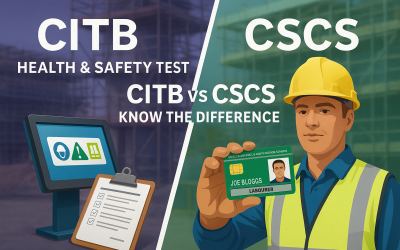Operatives vs. Managers CITB Test: What’s the Difference?
If you’re pursuing a career in the UK construction industry, taking the right CITB Health, Safety and Environment (HS&E) test is a critical first step. Designed to ensure all workers understand and adhere to essential safety protocols, the CITB tests are tailored to different roles and responsibilities across the industry. With options such as the Operatives and Specialists test and the Managers and Professionals test, it can be difficult to know which one is right for you.
In this guide, we’ll explore the major differences between these two categories of CITB tests. We’ll cover what each test includes, who it’s for, and how they align with specific CSCS card types. Whether you’re applying for a Labourer Card or aiming for a Black Manager Card, understanding the distinctions between these two tests will help you avoid costly mistakes and confidently move forward in your construction career.
What is the CITB Test and Why Does It Matter?
The CITB HS&E test is a standardised exam administered by the Construction Industry Training Board. It’s designed to ensure workers have the health, safety, and environmental knowledge necessary to operate safely on construction sites. Passing this test is a requirement for obtaining a CSCS (Construction Skills Certification Scheme) card, which is a key credential for employment in the construction industry across the UK.
Depending on your experience and career trajectory, you’ll need to take one of several variations of the test:
- Operatives and Specialists test: Suited for general labourers, apprentices, and skilled tradespeople like plumbers, electricians, and bricklayers.
- Managers and Professionals test: Required for site supervisors, project managers, architects, and other senior construction professionals.
Selecting the correct test not only affects your CSCS card eligibility but also impacts your job prospects and compliance with safety standards.
Key Stats and Industry Facts
- Over 500,000 CITB HS&E tests are taken annually in the UK (citb.co.uk).
- 50 multiple-choice questions must be completed in 45 minutes.
- Both test types require a minimum score of 45 out of 50 (90%) to pass.
- The Operatives test is the most common test for new entrants.
- The Managers test involves advanced knowledge of legal and environmental frameworks specific to senior roles.
Operatives vs. Managers Test: What Are the Main Differences?
While both tests share the goal of promoting workplace safety, they differ in scope, complexity, and relevance to particular roles.
Content and Topics Covered
Operatives and Specialists Test: This test covers foundational knowledge that all construction workers need to stay safe on site. It includes:
- General responsibilities under health and safety law.
- Safe working practices.
- Accident reporting and emergency procedures.
- Manual handling techniques.
- Working at height safely.
- Fire safety and electrical safety basics.
- Environmental awareness.
- Personal protective equipment (PPE) usage.
Managers and Professionals Test: In addition to covering the topics listed above, this test includes more advanced and role-specific content:
- Construction (Design and Management) Regulations (CDM).
- Duties and responsibilities of contractors and designers.
- Site and project management best practices.
- Risk assessment principles and methods.
- Incident investigation and reporting procedures.
- Legal frameworks governing health and safety.
- Environmental and sustainability considerations.
- Behavioral safety and leadership in safety culture.
Difficulty Level
- Operatives Test: Designed for those entering the industry or performing hands-on, task-oriented roles. The questions are straightforward and focus on essential knowledge.
- Managers Test: Suited for experienced professionals. This test includes case studies and situational judgment questions, requiring higher-level thinking and familiarity with management responsibilities.
Scoring and Format
- Both tests have a 90% pass threshold (45 correct out of 50 questions).
- However, the Managers test features more complex scenarios and regulation-based queries.
- Time allowed is the same (45 minutes), but candidates often find the Managers test more demanding due to the volume of content and its abstract nature.
Who Should Take Which Test?
Choosing the correct CITB test ensures your qualifications match the role you are aiming for. Here is a helpful breakdown:
Take the Operatives and Specialists test if you are:
- Applying for a Green Labourer Card, often required for general construction site access.
- A tradesperson pursuing a Blue or Gold Skilled Worker Card.
- A new entrant into the industry, such as an apprentice.
- A specialist contractor in fields like demolition, plumbing, or tiling.
Take the Managers and Professionals test if you are:
- Applying for a Black CSCS Manager Card, indicating senior site-level responsibility.
- Pursuing a Professionally Qualified Person (PQP) Card, which often applies to chartered professionals like engineers and architects.
- A supervisor, team leader, or anyone responsible for others’ safety on-site.
- Preparing for further qualifications in construction management or site supervision.
Quick Comparison Table
| Feature | Operatives Test | Managers Test |
| Intended For | Labourers, Skilled Workers | Supervisors, Managers, PQP Roles |
| Difficulty Level | Basic | Intermediate to Advanced |
| Topics | General H&S | Advanced H&S, CDM, Legal Compliance |
| Pass Score | 90% (45/50) | 90% (45/50) |
| Test Duration | 45 minutes | 45 minutes |
| Complexity | Straightforward questions | Scenario-based & legal questions |
| Prep Time Needed | 1–2 hours for revision | 5–10 hours recommended |
Making the Right Choice
When it comes to qualifying for a CSCS card, the first step is ensuring you take the correct CITB test. The Operatives and Specialists test is the go-to choice for labourers and skilled trades, offering essential knowledge in workplace safety. Meanwhile, the Managers and Professionals test delves deeper into regulatory frameworks, risk management, and leadership responsibilities — ideal for individuals in charge of teams or projects.
Understanding the differences in test content, difficulty, and purpose will help you make an informed decision and progress in your career without unnecessary setbacks.
Conclusion
Navigating the world of CITB testing can seem overwhelming, but knowing which exam aligns with your construction goals simplifies the process significantly. Whether you’re starting out on the tools or leading a team of contractors, there’s a CITB test designed for your level of responsibility.
Still unsure? Visit CITB Test Centre to explore more resources, access revision materials, and get help booking the right test. Your journey toward CSCS card certification begins with one smart decision—make sure it’s the right one.
Latest New & Updates
Special Assistance Options for the CITB Test
Discover every special assistance option for the CITB test—from language voice‑overs to extra time—so you can sit the exam with confidence and fairness.
CITB vs CSCS – What’s the Difference?
Confused about the CITB test and CSCS card? Learn the vital difference and the exact steps to secure your CSCS card first time.
Tips for Taking the Managers & Professionals CITB Test
Discover expert tips for taking the Managers & Professionals CITB Test and secure your CSCS card first time. Study smarter and beat the 90 % pass mark.




